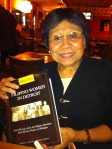Perrin’s legacy key to shaping EMEAC’s past and future
July 17, 2011
 Like many truly great individuals, the life and work of the late Dr. Eugene V. Perrin positively influenced a wide array of people and organizations. The East Michigan Environmental Action Council is humbled to be one of them.
Like many truly great individuals, the life and work of the late Dr. Eugene V. Perrin positively influenced a wide array of people and organizations. The East Michigan Environmental Action Council is humbled to be one of them.
In addition to being a renowned anti-war activist, philanthropist, college professor, World War II veteran, founder of the Nobel Peace Prize winning International Physicians for Preventnion of Nuclear War and a pioneer in researching uses of the human placenta among numerous other things, Dr. Perrin was also a long-time member of the EMEAC Board of Directors. There he helped shaped EMEAC’s scope beyond just environmental protectionism into the sphere of environmental justice.
“Dr. Gene Perrin was one of EMEAC's founding members and he was still a member of the EMEAC board when I came on as executive director,” said EMEAC Executive Director Diana Copeland who was brought on to guide EMEAC’s work into a more environmental justice framework. “I remember him as extremely friendly, very interesting and interested in so many things. He always had colorful political buttons covering his shirt, and he had a van to match, with political bumper stickers covering the entire back of the van, which he often used to help us move around recycling.”
Following his passing in May, Dr. Perrin’s memorial service held at the First Universalist Unitarian Church was attended by such distinguished public servants such as U.S. Congressman Hansen Clarke, Helen Weber of Peace Action of Michigan, Ralph Simpson of the America Civil Liberties Union of Michigan, and a special message from Congressman John Conyers. During that service, Perrin’s life work in human rights, peace activism, medicine and civil liberties was remembered in a special eulogy by First UU Pastor, Reverend Bill Neely and person reflections from his first wife, Dr. Jane Perrin, his children and grandchildren.
During his final days, Perrin learned that the First UU Building complex was about to be donated in perpetuity to EMEAC for the creation of a Cass Community Commons Space where like-minded organizations and businesses can pursue their goals of transforming community based on social justice models.
“He was in the hospital when he heard that the historic Unitarian Church and adjacent mansion had been donated to EMEAC and he and his partner (Linda Darga) said they just could not have been happier about the decision,” Copeland said. “I believe that the Community Commons that EMEAC and partners are creating in that historic space will be, if not already is, part of Dr. Perrin's legacy. He was so passionate about all justice issues and how they cross over. I really feel that is the essence of the Commons space.”
Perrin migrated with his parents Frances (Fannie) Levin and father Emanuel Paperno migrated from Kharkov, Ukraine in the early 20th century. After completing high school in 1944 age 16, Eugene served in the US Army 1944-45 excelling in Japanese language at Yale University. He graduated from Wayne State University 1949 and University of Michigan School of Medicine in 1953. He went on to become certified in anatomic pathology following residencies in Boston and New York.
He later went on to teach in the field of pathology at the University of Cincinnati, Case Western Reserve, and Wayne State University. There he was Professor of Pathology, adjunct professor of Anthropology. He was a founder of Society Pediatric Pathology, Charter Member Teratology Society.
Although he was a WWII veteran, Perrin was an anti-war activist and local founder of Physicians for Social Responsibility. He also became a member International Physicians for Prevention of Nuclear War, which received of the Nobel Peace Prize 1985. Perrin also found time to become an environmental activist and teacher. He studied environmental engineering, biology, medicine , clinical genetics and became a member of the International Joint Commission and East Michigan Environmental Action Council.











